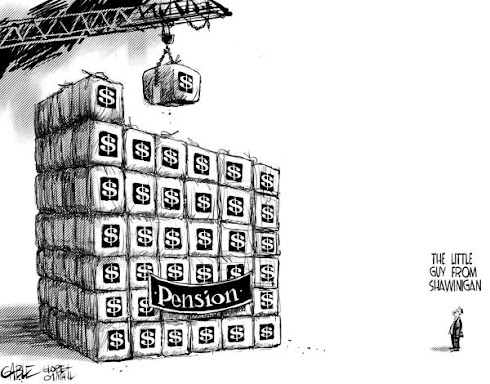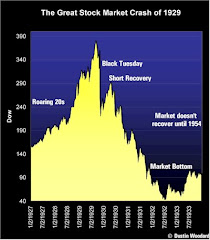It appears they are having discussions about the city Pension in Regina. At least we can say we saw this one coming. Original post April 2009.
It would be wise for the trustees to wait until the 2009 results are released before making any decisions. All too often we see governments rushing to make recommendation before the full scope of the problems are acknowledged and then saying OOPS... it too late. Here is the direct link to the pensions most recent annual report. Regina's Civic employee's Pension Plan
The Leader Post states:
"The trustees have provided information and experts so employers — represented by the City, which consults with the other employers — and the employees — represented by a committee of delegates from the 19 groups — can examine the options.""
"Bob Linner, vice-chairman and designated spokesperson for the Board of Trustees of the Civic Pension Plan. That board is made up of 12 representatives, with six from each of employer and employee groups."
The only problem is that the ones guarding the chicken coop are the foxes. It appears that everyone who has been brought to advise on the pension in probably is getting a union negotiated, taxpayer funded gold-plated pension.
Who is protecting the taxpayers interest? Although there was a gratuitous reference made to the taxpayers in the article I dont think it means much.
Here is a list of the items the taxpayers should be demanding from the city.
1) Fundamental changes - The taxpayers 'pension plans are not good enough. " Fundamental changes — such as to a defined contribution plan, in which risks rest solely with employees — have not been discussed. Such a shift would be considered "worst-case scenario". "
Note: we saw earlier in the week that the Province had already converted most of the public sector to DC plans. If it is good for taxpayers and provincial workers why is it worst case for city workers?
The Trustees have these items on the table:
- Increase contribution rates (subject to Canada Revenue Agency maximum employee contributions of 9%),
- Introduce less generous inflation protection after retirement,
- Reduce future benefits; or,
- Implement a combination of these options.
2) Plan shortfall - The pension plan lost $158 Million in 2008. Dropping to $685M total assets in the plan. The plan was up in 2009 to 85% funding from 75% funding in 2008. However, the markets are off already this year and quite likely will produce very meager returns.
3) Already the plan has fallen to the point more money is coming out than going in. There are almost as many retirees on the plans there is active workers contributing to the plan.
4) Contributions required to fund these types of pensions are about 34%. The current contributions fall short. By about 10%.
Member Contributions
5) Eliminate Pension Buy Back
You can also voluntarily increase your pension plan contribution before retirement by contacting Pensions. You may elect to:
- Purchase a period of service where you were previously a member of this Plan but received a refund of contributions upon termination. If you elect to purchase this service within 180 days of re-entering the Plan, you will receive credit for previously forfeited employer contributions.
- Purchase a period of service where you were employed by one of the employers participating in the Plan but were not a member of the Plan.
- Increase your post January 1, 1966 base salary pension factor from 1.35% to 2%.
Many pensions are looking at making 65 the mandatory retirement age
7) Ensure there is no Pension Spiking - Sick leave and Vacation Allowances usually are included in pension calculations. can we get FOI info on the pensions for these guys?
Retirees get big Pay Day
Pension Spiking Stinks
8) Commuted Pensions - Check the values of commuted pensions. The smart ones will be getting as much money out now as they can. Commuted Pensions
9) Double Dipping - Because of the early retirement provisions in the pension plan many employees trigger the pension and return to work shortly thereafter either with the city or another government organization. Many governments are taking responsible action and disallowing this type of taxpayer abuse. How Double Dipping works
Other notes:
http://www.regina.ca/
http://fairpensionsforall.
.




Thanks for posting this. It's unbelievable that defined contribution plans would be a last resort. It should be the first option because it is the only reasonable one!
ReplyDelete